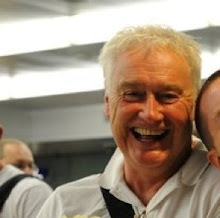Written for Londonist.com

A brand new Alan Ayckbourn comedy, his 74th, celebrating he’s now twice a prolific as Shakespeare, comes as close to London as its six month tour permits (Richmond this week, Windsor next) and seems to ask ‘am I ready for the West End?’
It has some familiar ingredients: three differently disappointed wives, three feckless or inert husbands, portrayals of the middle-English middle-class so accurate that if he’d set up a giant mirror in the bar of Richmond Theatre during the interval, Ayckbourn could have got a third act out of it – and, as in The Norman Conquests a male protagonist who manages to attract and then disrupt the equilibrium of wildly different women.
The novelty this time is that the ‘Norman’ character, George Riley, remains offstage throughout and his complex personality is revealed only in hearsay when his doctor gives him six months to live. Ayckbourn makes him so many different things to so many different people: mentor, rock idol, teacher, inspirational lover, moralist and endlessly supportive friend – and yet also someone that the other characters clearly don’t know as well as they think they do - that you might wonder if Ayckbourn is playing with faith and they’re talking about God.
The play’s clever because by restraining actual detail it makes the audience project their own fears, thoughts and doubts into the characters and their situation – what starts out as a surface comedy about amateur dramatics along the lines of his A Chorus of Disapproval turns into something much darker in the stronger second act when some uncomfortable truths are revealed.
At first it looks headed for a typical farcical ending and a quick curtain, but then twists sharply to a sombre conclusion which had the audience discussing it all the way back to the station. Is it headed for the West End? Possibly, and with an unexpectedly subtle central performance from Liza Goddard as the oldest of the wives as well as convincing support from Kim Wall as her husband, it already has the feel of a Shaftesbury Avenue production. But Ayckbourn often re-assesses his plays after their first outing and some judicious tightening and perhaps introducing the darker themes earlier in the process could make an interesting play even better.





